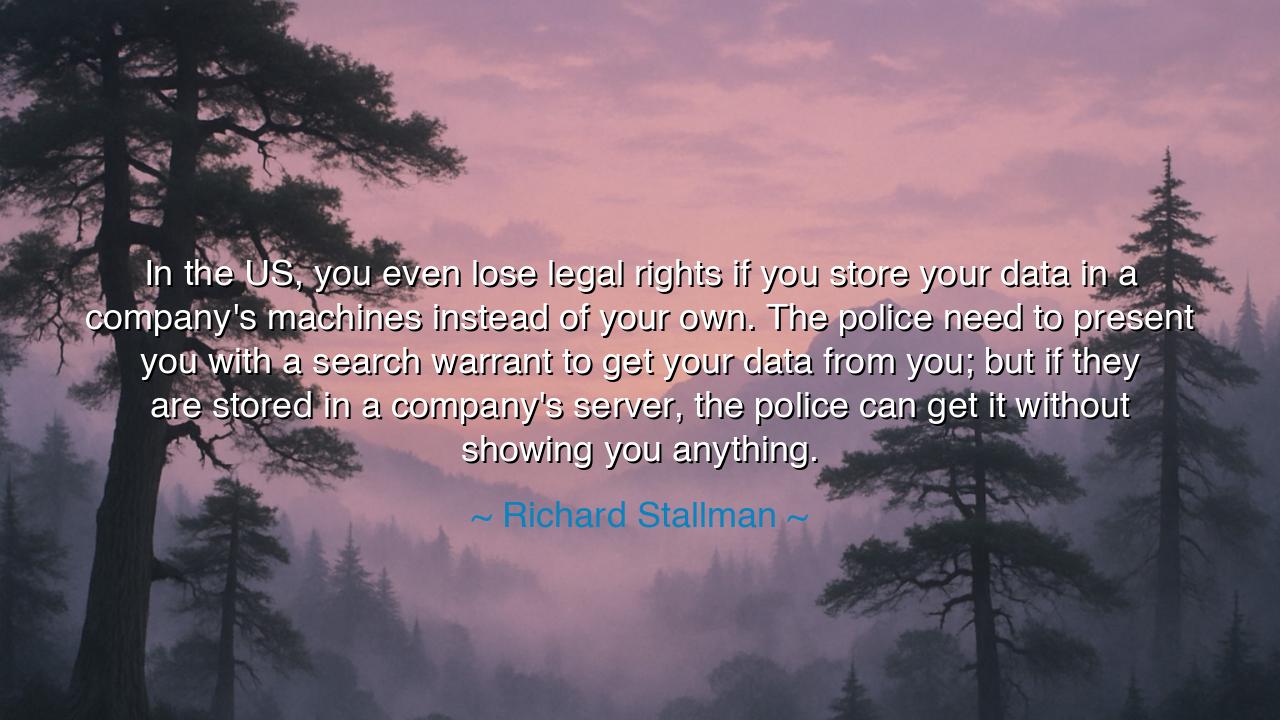
In the US, you even lose legal rights if you store your data in a
In the US, you even lose legal rights if you store your data in a company's machines instead of your own. The police need to present you with a search warrant to get your data from you; but if they are stored in a company's server, the police can get it without showing you anything.






The words of Richard Stallman, prophet of digital freedom and father of the free software movement, strike like a hammer upon the gates of complacency: “In the US, you even lose legal rights if you store your data in a company’s machines instead of your own. The police need to present you with a search warrant to get your data from you; but if they are stored in a company’s server, the police can get it without showing you anything.” This declaration unmasks a truth too often hidden beneath the glitter of convenience: that by entrusting our digital selves to others, we may surrender not only our privacy, but also the sacred shield of our legal rights.
The origin of Stallman’s words lies in the structure of modern law. In the United States, the so-called “third-party doctrine” holds that information shared with another—whether a phone company, a bank, or a cloud server—no longer carries the same expectation of privacy. Thus, when you keep your letters in your desk, the law requires a warrant to seize them; but when your emails rest on a company’s server, the state may claim easier access. Stallman, ever the sentinel of freedom, warns us that this shift is not small—it is the quiet erosion of rights that generations once fought to secure.
History has given us lessons in such erosion. In the days of the Roman Republic, the tribunes were sworn to protect the common people against unjust seizure. Yet as the Republic weakened, laws were bent and rights were reinterpreted, until citizens discovered that their safeguards existed only in name. So too today: the digital citizen believes himself free, yet discovers too late that by placing his private thoughts in distant machines, he has stepped outside the ancient circle of protection. What was once guarded by the Constitution now becomes vulnerable to the grasp of power.
Stallman’s warning is also deeply human. For in our age, data is the new self. Our memories, our letters, our labors, our loves—all are inscribed in the digital ether. To lose control of data is not merely to risk theft of property, but to risk the violation of dignity. What kings and emperors once sought with spies and soldiers, governments may now obtain with keystrokes, unburdened by the ritual of presenting cause before a judge. Thus, the danger is not distant, but immediate, and it concerns not only the technologist but every soul who entrusts their life to the cloud.
And yet, Stallman’s words are not despair, but call to vigilance. He does not counsel the abandonment of technology, but the reclaiming of autonomy. Just as the farmer of old stored grain in his own barns to ensure survival, so too must the citizen of today consider storing his digital harvest in his own machines. The lesson is that liberty is never a gift bestowed by authority—it is a duty, guarded by personal responsibility.
The teaching here is twofold. First, be ever mindful of where your data resides, for its place determines its protection. Second, demand of your leaders laws that keep pace with the age, so that rights once defended with parchment and sword may not vanish in the fog of technology. Just as earlier generations fought for habeas corpus, for due process, for freedom of speech, so too must we fight for digital rights, lest we awaken one day to find them gone.
Therefore, children of tomorrow, heed the wisdom of Richard Stallman. Guard your digital life as you would your home, for in truth, it is your home—your thoughts, your memories, your being. Store wisely, question deeply, and never surrender the belief that rights once won must be preserved in every age. For the battle for liberty is eternal, and in this age, its front lines are not only borders and ballots, but servers and clouds, where the fate of freedom is daily written in invisible code.






AAdministratorAdministrator
Welcome, honored guests. Please leave a comment, we will respond soon